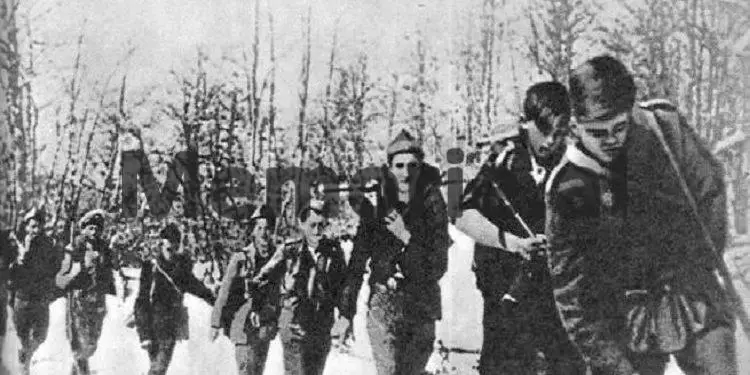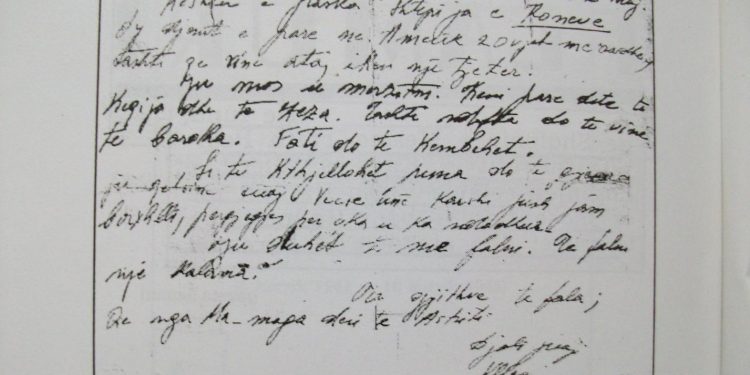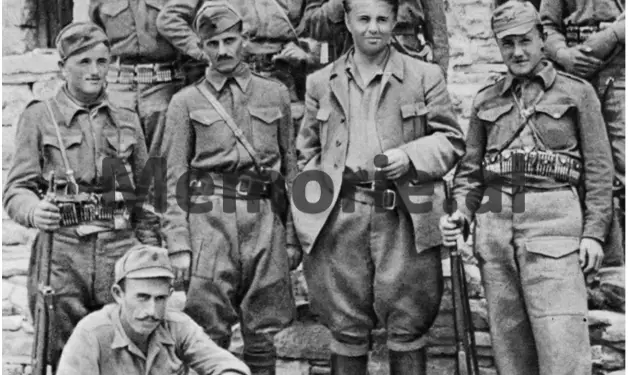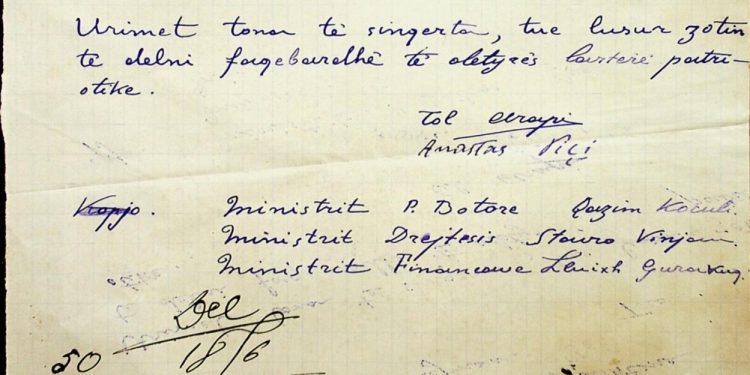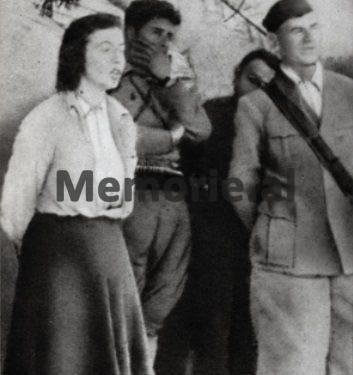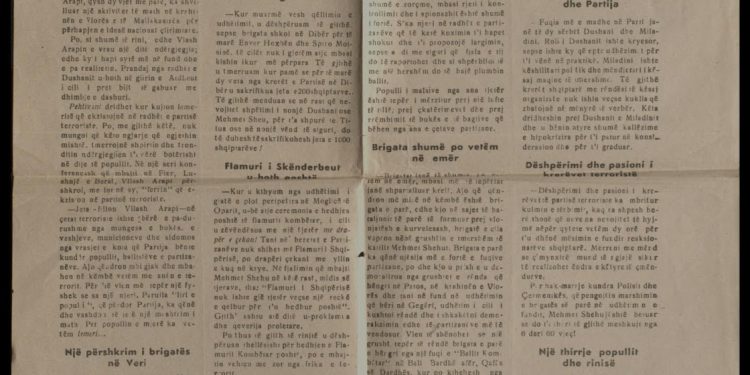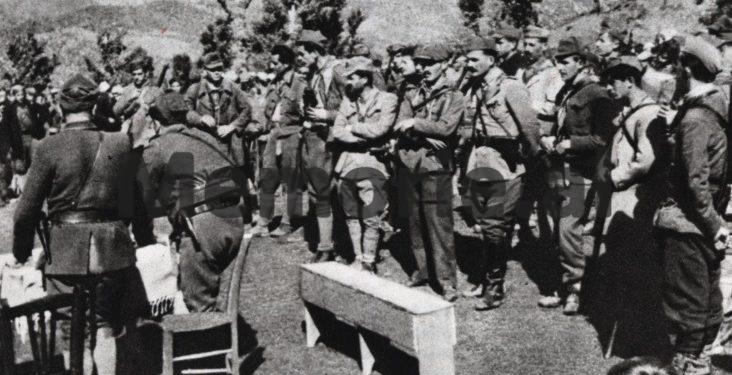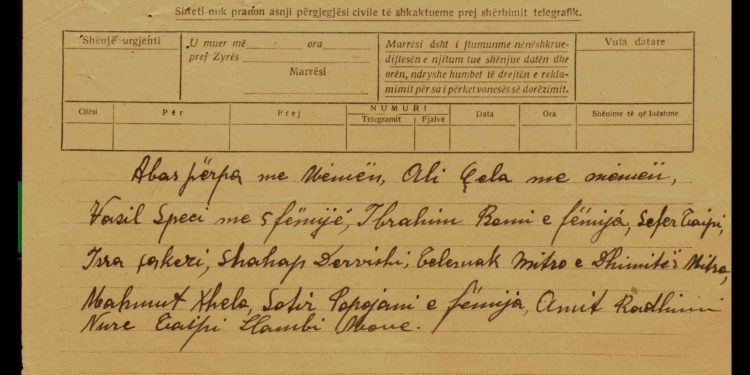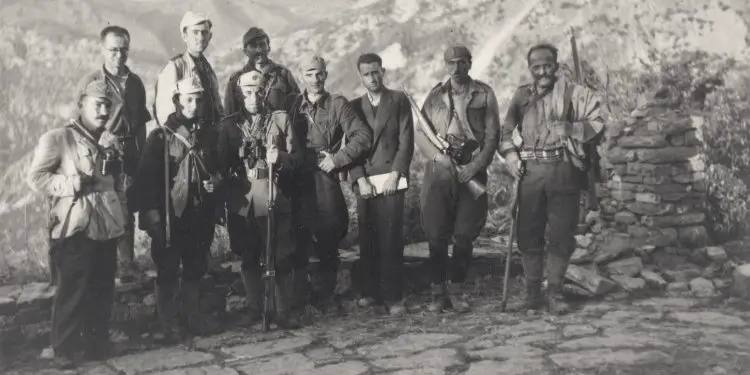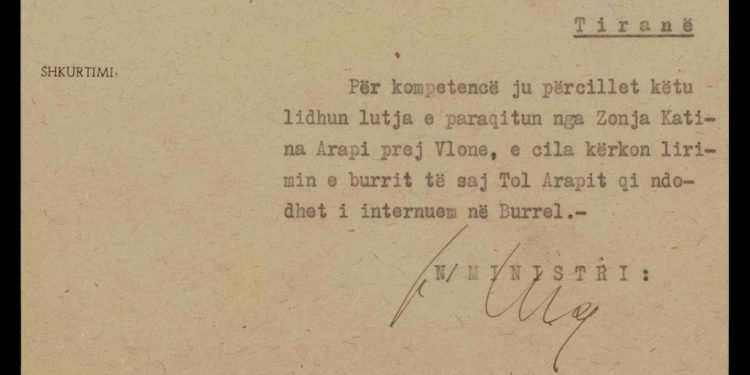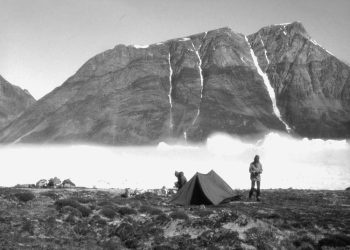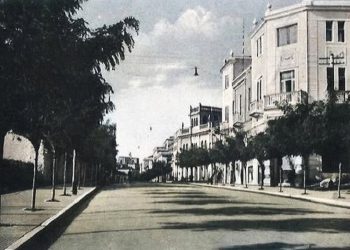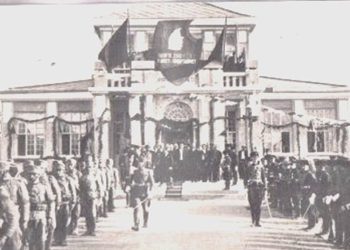Memorie.al / Tefta Arapi, my former professor, spoke to me in 1993 about the trips she had made to the villages of Kavaja, Rrogozhina, Berat, etc., searching for the traces of her brother, Vllas Arapi, and also showed me a thick notebook where she had kept notes. She asked me if I could write an article about Vllas Arapi, or perhaps even a book about him. At that time, this was a difficult undertaking for me, so I refused, a wish or rather a dream that her brother, Fatos, would realize with the book “Who Was Vllas Arapi” (Kush ishte Vllas Arapi). After so many years, in memory of my professor and in appreciation of Vllas Arapi’s work, I am publishing this article based on historical documents, which are being published for the first time.
The Patriotic Family of Tol Arapi
Tol Arapi comes from a well-known patriotic family in Vlora. He was born in Vlora in 1881, where he attended Greek school and then immigrated to Istanbul, where both his parents died. Early on, he became active in patriotic movements, participating in the insurgent bands of 1911–1912. In the government of Ismail Qemali, he served as police commissioner and fought against the rebels of Haxhi Qamili in 1914. He participated in the Vlora War in 1920, and at the conclusion of this war, he was reappointed police commissioner, while when Qazim Kokoshi was elected mayor, Tol Arapi would be appointed commissioner in the municipal police.
He advocated and fought for Albanian to be spoken in the Orthodox Church and in 1922; he participated in the Church Congress in Berat, as a delegate of Vlora, in the congress that founded the Albanian Autocephalous Church. During the Anti-Fascist War, (1939-1944), Tol Arapi turned his house into an important base for the Anti-Fascist Movement. The eldest son Vllas and the daughter Liria became flag bearers for the Vlora youth. For this reason, on May 8, 1942, his family was subjected to a search and raid by the occupier, but the family had managed to remove the compromising materials beforehand. On December 26, 1942, as soon as Halil Alia’s mercenaries arrived in Vlora, they arrested Tol Arapi, and two days later, on December 28, 1942, they burned his house and interned him along with about 40 other Vlora citizens in Gërmen, Burrel.
On February 13, 1943, the Vlora internees in Burrel, through a telegram, requested their release from the Presidency of the Council of Ministers: “We, a group of Vlora citizens, are interned in the Gërmen Concentration Camp – Burrel. These days some were released. Now 24 people remain old men, old women, wives, and children, who day and night eagerly await that merciful heart, which freed the first ones, to have compassion and mercy for our release, so that we may return to our burned hearths, as we are completely innocent.
Burrel 13.2.43
Tol Arapi, Abas Përpa with his mother, Ali Çela with his mother, Vasil Speci with 5 children, Ibrahim Bino and child, Sefer Taipi, Isa Çakërri, Shehap Dervishi, Telemak Mitro and Dhimitër Mitro, Mahmut Xhelo, Sotir Papajani and child, Hamit Radhima, Nure Taipi, Llambi Mone.”
Tol’s parents, Stavri and Aspasia, had given birth to 13 children, but only two survived, while Tol Arapi and his wife Katina would have 9 children, 5 boys and 4 girls. It should be emphasized that all 9 of Tol’s children lived and, although poor, completed higher education and left good marks in the history of the city of Vlora. Vllas Arapi (1922 –1946), completed the commercial school in Vlora. Liri Arapi (1923 – 1991), completed her higher pedagogical education in Naples, Italy. Liria was arrested on June 14, 1942, along with Sultana Çakërri and Xhemil Çakërri, but with the help of Uncle Tol’s friends, she was released on July 15, 1942, from where she went to the mountains as a partisan.
Pirro Arapi (1925 – 2022), completed his higher pedagogical education in Italy. Fatos Arapi (1930 – 2018), graduated as an economist in Sofia (Bulgaria) and became famous as a poet and writer. Petrit Arapi (1931-1977), senior economist. Shqiponja (1932), Bubulina Arapi (1933 – 1976), and Tefta Arapi (1935 – 1995) were teachers, and the youngest, Astrit (1937), was an engineer. Eight of Tol Arapi’s children enjoyed life. It was different for his eldest son, Vllas, who had a tragic end. Tol Arapi died in Vlora in 1962 and was buried in his place of origin, Zvërnec.
Vllas Arapi was among the first communists to predict that the Communist Party was turning into a terrorist Party, and he abandoned it. Vllas, known by his war pseudonym “Pelivani” or “Pelivan Vlora,” was born in the city of Vlora on February 22, 1922. He was one of the enthusiastic, active, intelligent, brave, and dedicated young communists, ready for any sacrifice for his freedom and homeland. In April 1942, he went underground, while his sister, Liria, would be arrested in June 1942.
The Prefecture of Vlora on 5.10.1942, in a list of 32 political escapees from Vlora, including; Mitat Dautaj, Xhemil Çakërri, Mynyr Xhindi, Naun Hondro, Hysni Abazaj, Jonus Mersini, Neki Hoxha from Gjormi, etc., writes for Vllas Arapi: “Vllas Arapi, son of Tol and Katina, born and residing in Vlora, aged 19, student, sentenced by the Military Court of Tirana for subversive propaganda.”
“On January 17, 1943, Marshal Mario Lombardi, commander of the Skelë station in Vlora, was killed by revolver shots. The communist perpetrators, with such a delinquent gesture, wanted to remove from this life a non-commissioned officer who had performed conspicuous services in the political police campaign, especially since he also knew the Albanian language well.
Following this crime, the General Command decided that four communists would be executed if the perpetrators of the crime did not surrender by the next morning. Thus, at noon on the 18th, four prisoners Mitaq Sallata, Astrit Kokoshi, Pavllo Kafia and Tole Bitri were executed near the civil hospital…”!
“The perpetrators of Marshal Lombardi’s murder have been identified as the criminals, Sallata Lefter and Vllas Arapi, on the run,” writes the Vlora Royal Police Headquarters. In the monograph that Fatos Arapi dedicates to Vllas, he does not say it outright, but lets us understand that the assassin of Marshal Lombardo was precisely his brother, Vllas. In February 1943, Vllas Arapi was sent to Mallakastër as the party leader.
“He was a completely different character from Mehmet Shehu. As a fighter, he accepted the war, he accepted the harshness of war, but he was against the terror and killings that Mehmet Shehu sowed wherever he went. He never stomached the throat-slitting of the carabinieri in Mallakastër, or the killing of the villagers in Divjakë…! Vllas’s other concern was the relationship with the nationalists.” (P. 101)
On August 15, 1943, Vllas Arapi would be transferred to the First Brigade. “According to testimonies, he is sometimes found in the second battalion, sometimes in the third, sometimes as the youth leader, sometimes as the company commissioner, but most of the time, he is a simple partisan…! Gjeli Argjiri is appointed commander of the third battalion, and according to his own statements, he is the one who executed Anastas Lula…! The assignment of Vllas as a simple partisan in the third battalion… is not an unintended action by Mehmet Shehu.” (P. 119).
In the winter of 1944, Mehmet Shehu’s First Brigade marched in extremely difficult conditions to save the General Staff that had remained surrounded. In these difficult moments, Vllas Arapi told Mehmet: “Why should three battalions be sacrificed for 12–13 people? They lead an army, and they can’t get out of the encirclement themselves?…” (P.125).
The terror that Mehmet Shehu exerted on the partisans, the war against the ‘Balli Kombëtar’ (National Front) and any opponent of his, deepened the contradictions of Vllas Arapi with Mehmet Shehu, who tried to eliminate him, but he managed to escape his ambush and fled the First Brigade on April 6, 1944.
“On April 6, Vllas Arapi (“Pelivani”) from Vlora deserted from our ranks,” writes Mehmet Shehu, “who on the 12th, held a speech in Fier, against our Brigade and against the Communist Party. This element was always alarming and especially lately. In Sulovë, he had shown signs of suspicion. He escaped from our hands.” (P.6,7)
Vllas Arapi’s Statements after Fleeing the Communist Forces
After fleeing Mehmet Shehu’s First Brigade, Vllas joined the forces of the “Balli Kombëtar.” He held meetings and speeches in the cities of Central Albania, where he denounced the violence and terror of the Communist Party. Below are his statements:
“From the ranks of Dushan, to the bosom of the Fatherland. Important declaration of Vllash Arapi”
“Youth! Be mindful; hold your elbows tight and your ranks, because the dirtiest and bloodiest dictatorship that the face of the earth has ever seen is approaching you, in which we will be nothing but slaves and a herd of cattle.” At the beginning of April, a 23-year-old young man, having set out from Maliq of Korça, passing through so many dangers all alone, after traversing a long road through Opar, Tomorricë, Sulovë, descended to Berat and presented himself to the Command of the “Balli Kombëtar.” This young man who surrendered was Vllash Arapi from Vlora, one of the main leaders of Mehmet Shehu’s Partisan Brigade.
Who is Vllash Arapi?!
– This is the one nicknamed “Pelivani,” whom, we believe, there is no man, youth, or woman in Toskëri who does not know him or has not heard his name. Vllash Arapi, two years ago, carried out a great activity in the region of Vlora and Mallakastër, for the spread of the national-liberation idea. But like many young people, Vllash Arapi’s conscience struck him one day, and he finally opened his eyes and saw the reality. Therefore, from the ranks of Dushan, he leaped into the bosom of the Fatherland, which awaits its mistaken sons with sorrow and love.
“Pelivani” shudders when he recalls the horrors that exist in the ranks of the Terrorist Party. But nevertheless, he did not fail to publicly inform the people of these events, which make one’s flesh creep, terrify the soul, and shake the conscience. In a series of conferences he held in Fier, Lushnjë, and Berat, Vllash Arapi described with tears in his eyes the “hell” that exists in the Terrorist Party.
– Life begins. Vllash Arapi: In the terrorist bands, the lack of food, clothing, ammunition, and especially the senseless killings that the Party committed against the people, Ballists, and partisans, had become unbearable. That Party stands on blood and is maintained only through terror. For it, a bullet is worth more than a man. The slogan “Freedom of the People” that the Party uses has been and continues to be a great deception. For the miserable people, there is only horror…!
A Description of the Brigade in the North
– A month and a half ago, Mehmet Shehu gave a speech, exalting the soldiers of the First Brigade with these words: “Comrades, we are tasked with making a long journey to the North of Albania, a journey whose mission is the most brilliant activity of the Party. This road is dangerous, as we will pass through difficult places, covered with snow, in enemy lands, where we will find neither bread nor shelter, but we will overcome these, even if we have to eat dead horses. We cannot reveal the purpose of our mission, because then all the partisan bands in the South will follow the Brigade, leaving the front empty. The First Brigade is enough to carry out this mission.” The Brigade set off and crossed the highest mountains of Central Albania.
May 1944
– It entered Martanesh, Gollobordë, came out at Gur i Bardhë, went to Shëngjergj, to Pezë, and from there entered Sulovë and Tomorricë. During this journey, we left 101 people dead, frozen by the snow, missing, or drowned in the Shkumbin River. In every village we went to, we were met with gunfire, and our reprisals were bloody. In Martanesh alone, we killed 25 people from the population. Thus, the number of dead partisans and villagers reached almost 200 people!
The Mission of the Brigade’s Journey
– When we learned the purpose of the journey, we were all disheartened, because the Brigade went to Dibra to get Enver Hoxha and Spiro Moisiu, whom we did not find there, as they had left earlier. We were all horrified when we saw that to get two people from the party leaders to Dibra, the lives of 200 Albanians were sacrificed! Everyone thought that; if the rescue of some Dushan or Mehmet Shehu was needed, to take them to Tirana, or to some other safe place, the lives of 1000 Albanians would have to be sacrificed.
Skanderbeg’s Flag Was Thrown Down
– When we returned from the long journey full of trials, in Moglicë of Opar, the ceremony of throwing down the National Flag took place there, which was replaced by another one, with a hammer and sickle! Now on the partisans’ berets, the Flag of Albania is no longer seen, but the hammer and sickle with the red star at the top. In the speech that Mehmet Shehu gave on this occasion, among other things, he said: “The Flag of Albania was nothing more than a rotten rag, to be thrown down.” Also that day, the proletarian government was proclaimed. Almost all the young people were deeply disheartened by the throwing down of the National Flag, but they barely held themselves back, out of fear of terror.
The Great Majority of the Youth Have Repented
– The great majority of the young people who are part of the party’s ranks have repented, as they see with their own eyes the abyss into which the national-liberation government is throwing the miserable homeland. Many of the young people have been able to leave and return to their hearths. Many others want to leave, but cannot find the opportunity. Albanian nationalism must do everything possible to help and save the youth from the hydras of terror, from the whelps of Dushan and Miladin. All the young people who have returned to their homes, after the calls and threats made by the party, replied: “Enough!”
I did not decide to leave all at once, for one reason or another, but for many reasons. They were daily events and facts, which, like drops of water, one after another, filled the cup and overflowed. With a retrospective look at the actions, wars, daily crimes, burnings, and ruins, I learned that the so-called national-liberation was not working for the liberation of the homeland, but for the extinction of the Arbën race.
Fleeing from the Party’s ranks is very difficult, as the network of control and espionage is very strong. No one in the partisan ranks has the courage to open up to a comrade and propose leaving, because they know for sure that their word will be reported and the immediate reward will be a bullet to the forehead. The people of the Highlands, on the other hand, are extremely upset by such a war, by the destruction, and by the snatching of bread and livestock carried out by the partisan bands.
Many Brigades, But Only in Name!
– The Brigades are numerous, but only in name, as they have completely dispersed. The one that stands best is the First Brigade, and even this is thanks to the First Battalion, formed by Vlora and Kurvelesh men. A Brigade that operates under the terrible fist of the killer Mehmet Shehu. The First Brigade was the strongest unit of the partisan forces, but even it was damaged and demoralized by the heavy blows it took in Patos, in the Vlora region, and now finally, in the journey it made to Gegëri, a journey that cost it heavily and caused the demoralization of the most determined partisans.
It is worth noting that the First Brigade took a very heavy blow from a “Balli Kombëtar” force at Mali i Bardhë near Qafa e Dardhës, when it was returning from the journey. This Balli force commanded by Muahrrem Kapllani, which, as I later learned, consisted of 120 people, managed to cut off the Brigade’s advance, inflict much damage, and prevent it from passing. So today, the partisan bands are no longer composed, as before, only of regular volunteers, but of crowds recruited by force and fear who fight because, behind them, political commissars stand with machine guns and weapons in hand, thus making escape difficult.
The Causes of the War against the “Balli Kombëtar”
– There is no doubt that the National Liberation opened the war against the “Balli Kombëtar.” The reason was because it was found that the largest mass of the people had a leaning towards nationalism and because the “Balli,” by organizing every day, would encompass all the forces and energies of Albania. The Terrorist Party saw the “Balli Kombëtar” as the greatest enemy, not only as a fighting force but also as a very healthy moral and intellectual force. The slogan of all partisans was: “We must do everything possible to eliminate the ‘Balli’.”
Dushan, Miladin, and the Party
– The Party’s greatest power are the two Serbs: Dushan and Miladin. Dushan’s role was primary, as he was the one who gave instructions to put into practice. Miladin was the political advisor and thinker of this terrible machine. All the important Albanian leaders of this organization were nothing but puppets, blindly carrying out the Serbs’ orders. They trembled before Dushan and Miladin and offered them many tales and hypocrisies to be considered and promoted.
The Despair and Passion of the Terrorist Leaders
– The despair and passion of the leaders of the Terrorist Party have reached the peak of fury, so much so that they often say: that we need to enter the cities for only two hours, to give the last lesson to the Albanian reactionaries. Imagine what a disaster could happen if the dream of these madmen were to be realized. For revenge against Polisi and Çermenika, which prevented the march of the First Brigade on the last journey, Mehmet Shehu has sworn that he will slaughter all males from 6 to 60 years old.
A Call to the People and Youth
– Vllash Arapi, concluding his statements, addresses this call to the Albanian people and youth: “Albanian People! Unite all as one block under the shadow of the Flag of Kastrioti and with the besa (pledge of honor) and manliness of your ancestors that characterizes you, rush against terror, otherwise, darker days await you. You must know that today the existence of a race is at stake, a race that has managed to survive throughout so many centuries of invasions. “Youth! Be mindful; hold your elbows tight and your ranks, because the dirtiest and bloodiest dictatorship that the face of the earth has ever seen is approaching you, in which we will be nothing but slaves and a herd of cattle.”
May, 1944 Balli Kombëtar
The Murder of Vllas Arapi
After fleeing the First Brigade, Vllas Arapi stayed with the “Balli Kombëtar” forces in Central Albania, propagandizing against the terror and civil war of the Communist Party. After the liberation, in 1945, he would join the anti-communist groups that resisted the communist regime. For this reason, Tol Arapi’s family did not escape the persecution of the communists, who, upon coming to power in 1945; “held him and his elderly mother-in-law in prison for three months.”
“One day on the road, Kadri Hazbiu met Vllas’s mother, with whom he had eaten bread several times during the War. He greeted her and gave her a note that read: ‘Uncle Toli, tell Vllas to surrender and to gladly accept the punishment that the Party will give him.’ But Uncle Toli did not surrender and did not trust Vllas’s former communist comrades. In his last letter, he wrote to his son: ‘The last bullet for you. I do not want to see you in their hands. You have my blessing. Toli’”
The newspaper “Flamuri” (The Flag), published by the “Balli Kombëtar” in emigration, wrote in 1950: “In Central Albania…, the bands of Vlash Arapi and his comrades, made the roads unsafe and attacked communist centers and forces with success and bravery every time.” (P. 185)
These patriotic men like Vllas Arapi, who opposed the communist dictatorship with arms, were persecuted with terror. Due to the persecution, Vllas Arapi was killed on the night of June 6, 1946. He was killed by betrayal, by State Security agents infiltrated into the anti-communist resistance groups. “Vllas was brought back dead by cart from the village of Domës. I saw Vllas dead in the morgue, naked, with seven wounds on his body.
His face was completely regular and his body very well-built. I myself saw the gold tooth in his mouth. The villagers said that; he was brave above the brave. The police took him to be buried. After Vllas was killed, the villager who was with him surrendered. Babë Myslim took him under his protection,” declared the Deputy Chairman of the Internal Branch of Kavaja. Tol Arapi’s family was dressed in black, and even Liria, his sister, who was a partisan and a communist, was dressed in black.
We Did Not Know It Would Turn Out This Way…!
Those who tried to eliminate Vllas Arapi, paid with their own skin, for a very small part of the crimes they had committed: Mehmet Shehu, in December 1981, killed himself in his newly built villa. Kadri Hazbiu, according to the stories, when they took him to be executed, had actually died long before, from torture in the investigation. General Gjeli Argjiri, seized by a severe nervous breakdown, around the same time, threw himself from the balcony of his house, shouting: “We did not know it would turn out this way…”!
CONCLUSION
Whenever we read or write about that inhuman system of communist dictatorship, that prophetic expression of Luigj Gurakuqi comes to mind, who had the fate not to see Albanians killing each other during the final years of the Second World War, and who had written as early as 1919: “You Albanians must know that the enemies of our homeland and nation work, as they have always worked… to present us to the world… not as a nation that deserves its own life, but as some tribes, who have never had unity with each other, as wild and undisciplined people who, if left alone, would eat each other alive…”! Memorie.al




